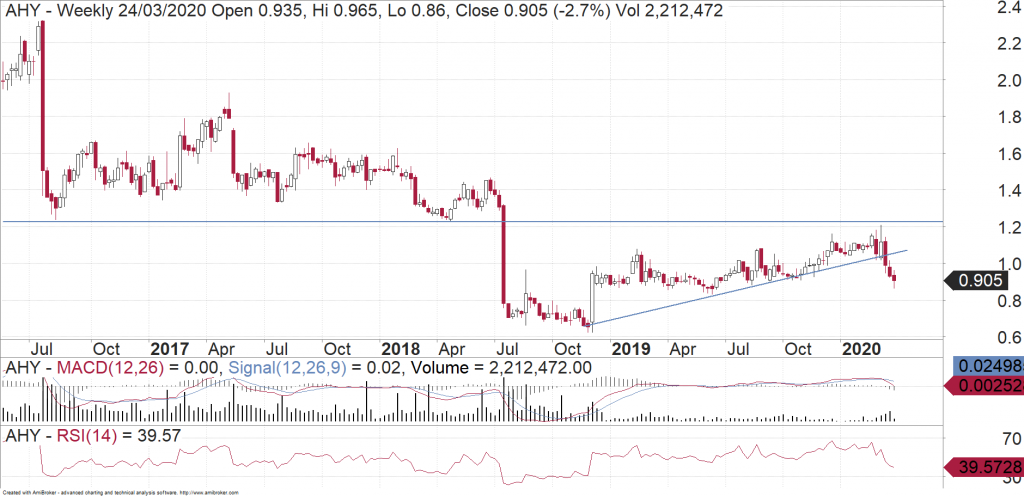We recently reviewed the fundamentals for Asaleo Care (ASX:AHY) in order to assess the potential for a re-rating in light of the Company now having a more predictable (and defensive) earnings profile. We also looked at the extent to which this factor would insulate earnings during the current coronavirus crisis.
About Asaleo Care
Asaleo manufactures personal care and hygiene products, which are distributed through retailers, distributors, and directly to corporate accounts. Following the sale of the Consumer Tissue Australia business in March 2019, the Company now reports across two segments – B2B and Retail – which contribute roughly evenly to revenue. The earnings base is more skewed to the BSB segment, which has a higher margin than the Retail segment.
The Company’s major shareholder is Essity, who hold a 36.2% stake in AHY. In addition to its shareholding in AHY, Essity has entered into a number of commercial agreements with AHY relating to the supply and purchase of Personal Care and Professional Hygiene products, the licensing of certain trademarks, technology and intellectual property, as well as other commercial arrangements. AHY pays Essity an annual royalty for the exclusive licence to use certain brands (including Tork and TENA), technology and other intellectual property in Australia, NZ and specified countries in the Pacific region.
Higher Costs Mitigating Revenue Growth for Both Segments
Revenue growth for the year to 31 December 2019 (FY19) was driven by both the B2B and Retail segments. Major supermarkets account for less than 15% of group sales and earnings and around a quarter of sales for the Retail segment. The remaining sales are generated from Business-to-Business (B2B), NZ supermarket, pharmacy and online.
To offset the impact on pricing from the major supermarkets, as well as of aggressive price discounting by key competitors (most recent from Kimberly Clark in the feminine hygiene category), the Company has invested heavily in marketing in order to support organic growth.
The Company expects two more years of investment in the current business strategy to support organic growth; in particular, total marketing expenditure as a percent of sales is expected to increase further in FY20. So, while the increased expenditure on marketing has the potential to improve margin, this still appears to be a medium-term benefit.
Relief from Lower Pulp Prices Expected to be Offset by Higher Costs
AHY uses a blend of hardwood and softwood pulp. Hardwood pulp prices began to fall in early 2019 from elevated levels, mainly as a result of slowing demand from China. Unfortunately, increased costs associated with continued brand and market investment, as well as higher energy, insurance & currency impacts are expected to offset the benefit from lower pulp prices in FY20 (relative to FY19) as well as the potential for further cost efficiencies.
Pulp prices beyond FY20 are expected to remain relatively flat, given that, firstly, new hardwood capacity is expected for 2021 and secondly, there is likely to be lower demand levels from China as a result of potential coronavirus impacts.
Scope for Acquisitions & Sustainable Dividends
The current gearing level (1.95x as at 31 December 2019 on a net debt to EBITDA basis) is in the middle of the target range of 1.5x to 2.5x EBITDA and is likely to reduce further, given that the cash generation returned in 2H19 and cash outflows related to the Australian Consumer Tissue business in FY19 and the large capital investment in NZ manufacturing, will not be repeated.
The stronger balance sheet position also opens up the potential for acquisition opportunities over the medium term, with the Company likely to target potential acquisitions in the personal care space. Based on the current net debt position of $139m and total debt facilities of $250m, the Company is estimated to have debt capacity of ~$100m for further acquisitions. Further, the next debt maturity profile does not include any near terms expiries. Of the $250m in total debt facilities, the next maturity is a $70m facility due on 31 July 2021.
Fundamental View
In summary, we struggle to see any real catalysts for a re-rating. Headwinds from costs, pulp prices and currency remain. Importantly, a more meaningful benefit to earnings growth is not expected until FY22 given that the Company has flagged a further two years of investment in the current business strategy. Investment in marketing and brand, which has so far driven an improvement in volume and sales, has still not translated into meaningful profit and margin growth.
With the Company still committed to further investment in FY20 in order to support organic growth and couple with other cost headwinds, we see potential risk to the Company achieving its FY20 earnings guidance, which implies growth of 2% to <6% on FY19.
Charting View
AHY had recently broken below the uptrend line that started at the end of 2018. With momentum still to the downside, we expect it to fall towards the lower support level near 84c. Any short term rallies will retest the underneath of the trend line which is about $1.02.

Michael Gable is managing director of Fairmont Equities.
Current share prices available here.
You can learn more about technical analysis in this article.
An 8-week FREE TRIAL to The Dynamic Investor can be found HERE.
Would you like us to call you when we have a great idea? Check out our services.
Disclaimer: The information in this article is general advice only. Read our full disclaimer HERE.
Like this article? Share it now on Facebook and Twitter!

